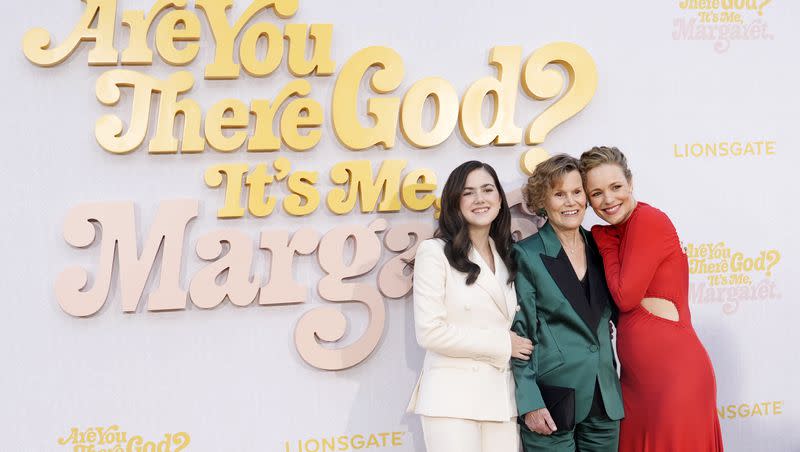Perspective: ‘Are You There God? It’s Me, Margaret’ — is it dated or ahead of its time?

- Oops!Something went wrong.Please try again later.
When “Are You There God? It’s Me, Margaret” was first published in 1970, fewer than 5% of Americans said they had no religious affiliation. No wonder Judy Blume’s titular character— 11-year-old Margaret Simon — hates religious holidays. No one likes feeling left out.
In both the classic book and the new movie, Margaret is being raised without religion by a Christian mother and a Jewish father who tell their daughter that she can choose her own faith as an adult.
Bereft of the religious upbringing of her peers, Margaret feels different; like most preteens of all eras, she would prefer to fit in. “Please just do this one thing for me. Just let me be normal and regular like everybody else. Just please, please, please, please, please,” Margaret prays in the film.
It seems that Margaret has gotten her wish in 2023, at least when it comes to faith.
In 2022, the share of religiously unaffiliated Americans was at 29%, and rising. Among families of the Simon family’s demographic — 30-something professionals in suburban New York — the share of so-called “nones” is even higher than that.
Margaret’s religious nonformation, which was so unique in 1970 that it made her a memorable literary character, is today essentially normative for many American families. I find this sad and troubling.
Like Margaret, I am the product of an interfaith marriage: my father was raised Catholic, and my mother was raised Jewish. When I was born in 1987, the percentage of Americans that considered themselves religiously unaffiliated still hovered just above 5%.
Like most people 35 years ago, my parents made a different choice than Margaret’s parents did. They thought of religion as a foundational question that would help shape how they raised me — not a lifestyle choice that could be put off a decade or two.
Related
Religious disaffiliation is rising. Is there a path back to the fold?
Perspective: Why even secular people should worry about Gen Z’s lack of faith
Like my father, I was raised Catholic — but with a bonus of cultural Judaism that came from my mom. We were regulars at several Jewish delis and attended various seders. Unlike Margaret, whose parents attempt to avoid the discussion of religion altogether, I also had regular, interesting conversations with friends and family — Catholic, Protestant and Jewish— about religious similarities and differences.
Today, as a parent, I center my children’s familial, educational and communal lives largely around the practice of the faith tradition in which my husband and I were each brought up. We hope and pray that we are offering our children a religious formation with sufficient intellectual, spiritual and cultural heft that they will be intentional about continuing to practice the faith as adults.
Because there is one thing we know for sure: if our sons aren’t intentional about religious practice on their own, the increasing secularization of American culture in the 2020s and 2030s will not help them to become so.
Of course, “Are You There God, It’s Me, Margaret” is primarily a coming-of-age story, not a parable of faith. The book is best known for addressing the timeless problems of adolescent girlhood, including bra shopping and first crushes. (It was once considered quite controversial and periodically censored up until the 1990s.)
In her attempt to locate God in churches and synagogues despite having never been introduced to organized religion, Margaret is straight out of 1970. But, in their attempt to insulate their daughter from the personal and familial conflicts that they associate with faith, her parents are straight out of our present.
In this way, “Are You There God? It’s Me, Margaret” was ahead of its time, reflecting the pursuit of an individualized spirituality, but without the organized religious practices and community that are broadly useful for young people.
But there is hope to be found in Margaret’s story, too.
Alone in her room, Margaret seeks a higher being. Her search for faith does not stem from or depend upon childhood teaching; it is an inner drive that is inextricable from her God-given curiosity about herself and the wider world.
In the end, my children — and all of our children, no matter how we raise them — are like Margaret: they do have sovereignty over what they believe, and they will one day have sovereignty over how they live. Countless children raised within an organized religion turn from their family’s faith as young adults, never to return. But as Pew Research Center has found, there is a correlation between the strength of a family’s religious commitment and whether the child remains in the faith as an adult.
Ultimately, our superordinate hope as religious parents has to be not that our children accept exactly what we have taught them about God — but that they, like Margaret, are unafraid to ask their deepest questions in pursuit of faith, reason and truth.
After all, if we believe what we profess, we must trust that good questions and faithful answers will find and reinforce one another. To seek — “Are you there, God?” — is to find.
Elizabeth Grace Matthew is a freelance writer, an America’s Future Foundation Writing Fellowship alumna and a Young Voices contributor. Her work has appeared in America Magazine, The Hill, Law and Liberty, Real Clear Books & Culture, the Pittsburgh Post-Gazette and The Philadelphia Inquirer.

